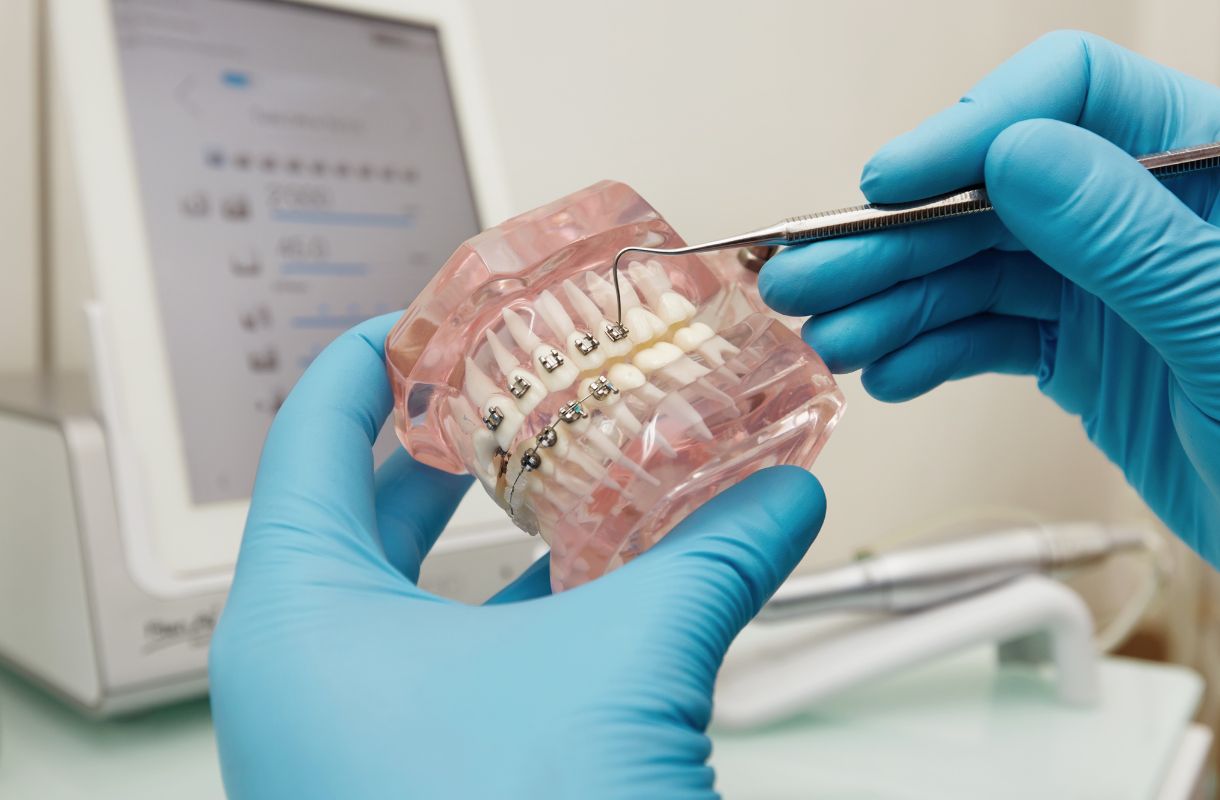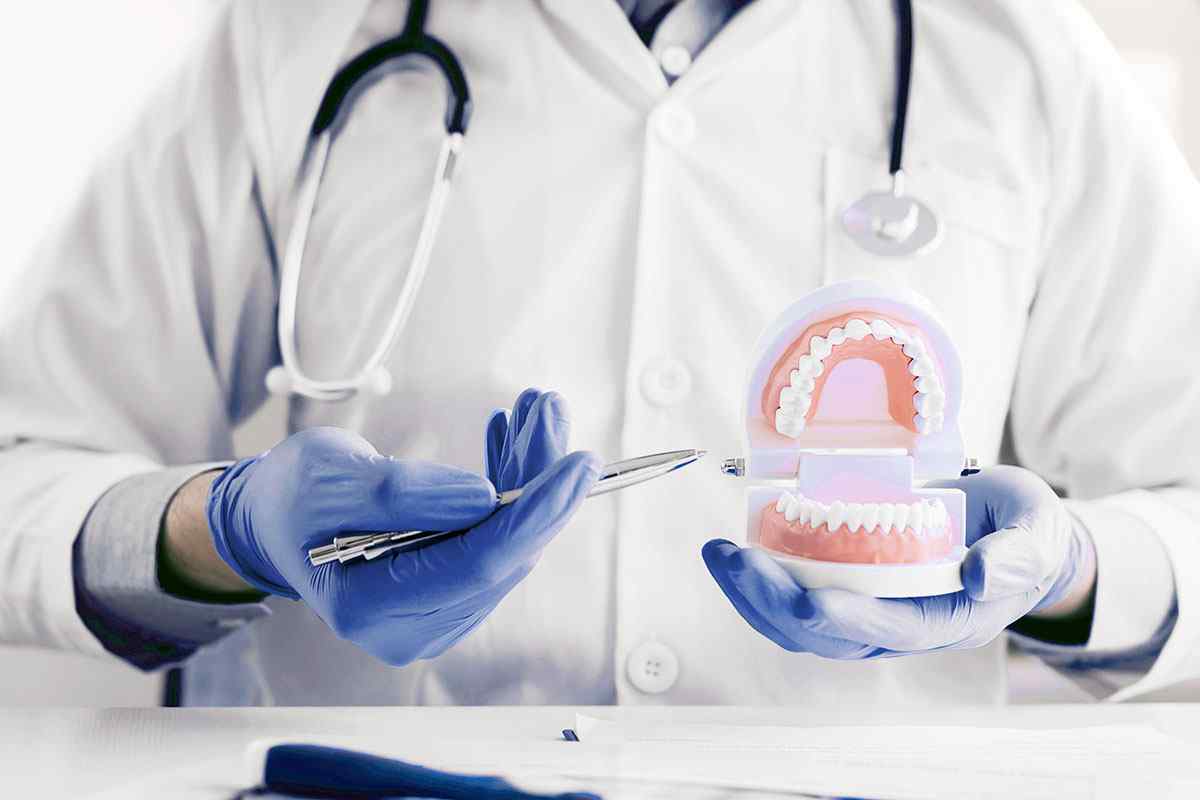What are
Dentures?
Dentures are prosthetic devices constructed to replace missing teeth and are supported by the surrounding soft and hard tissues of the oral cavity.
There are two main types of dentures: complete and partial. Complete dentures are used when all teeth are missing, while partial dentures are used when some natural teeth remain.
Types of Dentures
There are several types of dentures, includes:
1. Complete Dentures
Complete dentures can be either “conventional” or “immediate.” Conventional dentures are made after the teeth have been removed and the gum tissue has healed, typically taking 8 to 12 weeks.
Immediate dentures, on the other hand, are made in advance and can be positioned as soon as the teeth are removed, allowing the wearer to avoid being without teeth during the healing period.
2. Partial Dentures
Partial dentures consist of replacement teeth attached to a gum-colored plastic base, sometimes connected by a metal framework that holds the denture in place.
They are used when one or more natural teeth remain in the upper or lower jaw. Partial dentures not only fill in the spaces created by missing teeth but also prevent other teeth from changing position.
3. Implant-Supported Dentures
Implant-supported dentures are a more stable option, as they are attached to dental implants. These dentures provide better support and stability, reducing movement and enhancing comfort.
Implant-supported dentures are particularly beneficial for the lower jaw, where traditional dentures tend to be less stable.
The types of dentures materials used can vary, affecting both the appearance and durability of the prosthetic. Common materials include:
- Acrylic resin: Lightweight and affordable
- Porcelain: Closely resembles natural teeth
- Metal (for partial dentures): Provides strength and stability
The best artificial teeth material often depends on individual needs, but many dentists recommend porcelain for its natural appearance and durability.
Benefits of Dentures
- Improved Appearance: Dentures help restore the appearance of a full set of teeth, enhancing facial aesthetics and boosting confidence.
- Enhanced Functionality: They allow individuals to chew and speak more effectively, improving overall quality of life.
- Support for Facial Muscles: Dentures help maintain the structure of the face, preventing the sunken appearance that can occur with tooth loss.
- Customizable Fit: Modern dentures are designed to fit comfortably and securely, tailored to the individual’s mouth for optimal performance.
The Process of Getting Dentures
The process of getting dentures includes multiple steps, such as:
1. Consultation
The process begins with a dental consultation to evaluate the patient’s oral health and determine the most suitable type of denture. The dentist will discuss the options and answer any questions the patient may have.
2. Impressions
Impressions of the mouth are taken to create a model for the dentures. This step ensures that the dentures fit comfortably and accurately.
3. Jaw Relation Records
The dentist records the relationship between the upper and lower jaws to ensure proper alignment of the dentures. This step is crucial for achieving a natural bite and appearance.
4. Try-In Appointment
A try-in appointment allows the patient to preview the dentures before they are finalized. Adjustments can be made to ensure a perfect fit and appearance.
During the try-in appointment, patients can preview their artificial teeth set to ensure proper fit and appearance before final fabrication.
5. Delivery and Follow-Up
Once the dentures are ready, they are delivered to the patient. Follow-up appointments are scheduled to make any necessary adjustments and ensure the dentures fit comfortably and function properly.
Types of Dentures and Cost
The types of dentures and cost can vary significantly based on the materials used and the complexity of the case. Here’s a general overview of dentures cost:
- Complete Dentures:
- Cost range: ₹15,000 to ₹40,000 per arch
- Partial Dentures:
- Normal partial denture :Cost range: ₹12,000 to ₹20,000
- Flexible denture :18000 to 25000
- Cast partial denture ;30000 to 40000
- Implant-Supported Dentures:
- All-on-4 fixture: average cost range 2 lac to 3 lac
- Over denture :120000 to 160000
These prices are estimates and can vary based on location, dentist experience, and specific patient needs.
Care and Maintenance of Dentures
Proper care is essential to maintain the longevity and functionality of dentures:
- Handling Dentures:
When handling dentures, work over a cushioned surface or basin to avoid breakage. Keep dentures moist in a denture cleansing solution or plain water, never hot water, to prevent distortion. - Daily Cleaning:
Brush dentures daily with a soft brush and liquid soap to remove food and plaque. Avoid toothpaste, which can leave residue. Brush your gums, tongue, and palate every morning before inserting dentures to stimulate circulation and remove debris. - Night Care:
Remove dentures every night to give your tissues a rest. If dentures break, chip, or become loose, consult your dentist instead of trying to adjust them yourself. - Age-Related Changes:
As your mouth changes with age, dentures may loosen and require relining, remaking, or rebasing. Rebasing involves making a new base while keeping the existing teeth. Schedule at least an annual check-up with your dentist.
FAQs
What is the best thing to soak dentures in?
Specialized solutions are best for cleaning, disinfecting, and deodorizing dentures overnight. Alternatively, plain water can prevent dentures from drying out.
How long can dentures stay in water?
Dentures should be soaked in water or a denture-cleaning solution overnight to maintain moisture and prevent warping.
Why remove dentures at night?
Removing dentures allows gums to rest, reducing the risk of gum disease and oral infections like denture stomatitis. It also prevents bacterial buildup.
How many times do you clean dentures?
Dentures should be cleaned at least once a day, ideally twice, to remove food particles and bacteria. Regular cleaning helps maintain oral hygiene and denture longevity.
Can you nap with dentures in?
Napping with dentures increases the risk of oral health issues, such as gum inflammation and bacterial infections. It’s best to remove them to allow gums to rest.
General Dentistry
Get In Touch With Us
Call us
+91 9676100045 - Punjagutta
+91 7702425551 - Hitech City
+91 7702425551 - Hitech City
Email us
reception@smiline.com
Book An Appointment
Book a visit to Smiline, simply fill out the form below and we will contact you back regarding the intervention you require.



